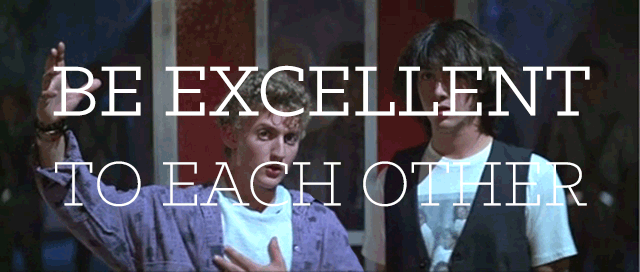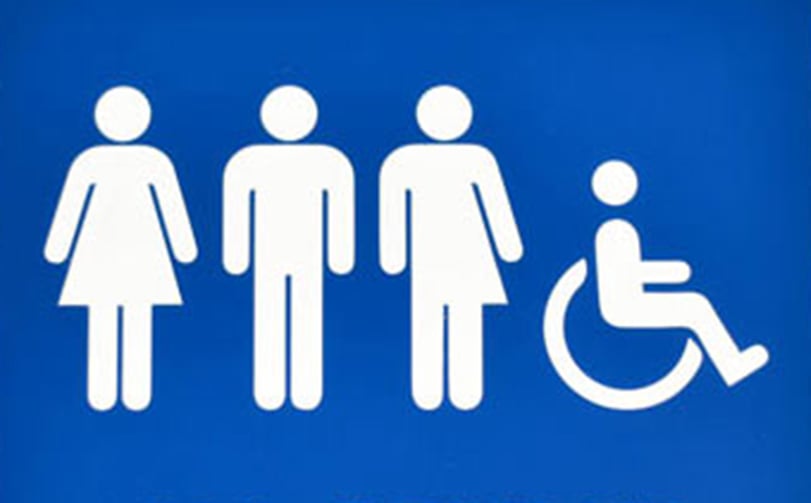#BeExcellent: Welcoming Audiences of All Genders
At Fractured Atlas, we strive to exhibit a number of core behavioral values in our daily work. Among those is a value that cuts to the heart of how we seek to engage with everyone we come in contact with, whether we’re assisting one of our members or working with our colleagues at Fractured Atlas HQ. It goes without saying: we should all be excellent to each other.
 "Be Excellent to Each Other," a GIF via Giphy.
"Be Excellent to Each Other," a GIF via Giphy.
In practice, this means that we devote our time and energy to giving our artist members and peers our attention and support in ways that convey our care and respect. While artists are often depicted in popular culture as individual geniuses working in isolation, the truth is that all artists engage with and interact with members of their own communities in one way another, whether producing a musical, hosting a reading series, or sharing visual art on Tumblr. In this series, we will focus on substantive ways that we can each strive to #BeExcellent to each other in the business side of our arts practices.
Our staff has learned quite a bit from direct experience in our work at Fractured Atlas, in our individual arts practices, and beyond. We are constantly seeking to learn how we can better serve our members, and we’ve learned a lot of lessons first-hand and from insights shared within our communities. We’re excited to share both what we’ve learned and resources to learn more.
Upcoming blog posts in the series will cover a range of topics. We’ll start with best practices for writing fundraising materials that aim to include all members of your community, and first steps to organize and host events that welcome all audiences regardless of ability. Over the course of the series, you’ll notice that some lessons will intersect across spaces and topics. While one post might serve as a general primer on a certain topic, other posts will hone in on the fine grain of particular issues.
For today, I’m kicking off our series by writing about welcoming audiences of all genders.

If you’re a Fractured Atlas member and you’ve emailed with a member of our programs team sometime within the past year, you’ve likely noticed that we include our personal pronouns in the signature of each email we send. In part, this removes some guesswork in case you were wondering what each of our pronouns are. It is also a good practice to signal to folks you are communicating with, that you’re aware that no one’s personal pronouns should be assumed. Rather, we should each be given an opportunity to say for ourselves how we’d like to be gendered in language, if at all. Adding pronouns to my email signature is a relatively painless way to let everyone I email with know that they can use “they/them” or he/him” pronouns to refer to me.
There are a number of situations socially and professionally, where gender surfaces in communication. In person, you might assume someone’s gender based on their hair, features, or clothing. If you’re on the phone making a ticket sale, you might assume a person’s gender based on the sound of their voice. I might be tempted to put on a deeper voice so I can avoid being misgendered when I make a phone call. “Misgendering” is a term for when individuals are referred to by a gendered pronoun or term in written or spoken communication in an incorrect way. If my voice comes off as high-pitched over the phone, and someone incorrectly calls me “ma’am,” that’s an example.
Phone calls are one place to start by avoiding the impulse to say “sir” or “ma’am” when you really don’t know the person you’re talking with. Being mindful and conscientious applies to any interaction, but there are a few common touchpoints you might keep in mind:
- If a donor writes a check to support your project or hands you a credit card to purchase tickets at your event, be mindful that that person’s legal name might not be the name they are called. Instead of reading a name off their card, introduce yourself, ask their name, and thank them for their donation or for coming to your show.
- Don’t assume someone’s gender or the pronouns they use based on their first name. You might perceive their name as gender-specific, but if you don’t really know the person you’re talking with or emailing, you run the risk of inadvertently misgendering them.
- Avoid the impulse to include the words “Dear Sir/Madam” in correspondence. Not everyone identifies as a “sir” or a “madam” and frankly, that form of address is so formal, it doesn’t exactly make me feel welcomed. And if you’re making a request, you’re much better off finding out who your letter should be personally addressed to. Otherwise, your letter may come off as generic and not tailored for the recipient.
- If you’re rallying a group of people to their seats or introducing your show, you might try a form of address other than “ladies and gentlemen.” Avoid marginalizing non-binary folks who you want to feel welcome at your event by going for a creative welcoming greeting that doesn’t reinforce the binary we all live with.
- Rely on what you know from what an individual has shared with you, not your assumptions. If in doubt, it’s always better to politely ask, “what pronouns do you use?” than to assume. And if that’s not possible, and you need to refer to someone in the third person, it’s always better to say, “this person here in the yellow shirt needs some assistance,” or “they need some help,” instead of, “can you show this man to his seat?”
- If someone asks you where the bathroom is, tell them where all the bathrooms are located. Don’t assume that someone will use the men’s or women’s bathroom based on their appearance. And if you’re deciding between two venues for your show, try to choose the venue that offers gender-neutral and/or single-user restrooms.
There are no hard and fast rules, and there’s no “right thing” to say in every situation. The point is not to guess someone’s gender or experience of gender correctly, but to be mindful and respectful no matter what. Your goal is to cultivate a community, where all members of your audience feel welcomed by the words that you choose. There’s always more that can be said and more that we can each learn as we strive to #BeExcellent to each other. Throughout this series, we’ll dive into a range of topics like this one as we seek to engage mindfully with all members of our communities.
Join Us: Click here to become become a member.
Fractured Atlas on Social: Instagram | Tumblr | Twitter | Facebook
About Arno Mokros
Arno Mokros is a queer writer, print artist, and administrative professional committed to fostering accessibility and inclusion in arts communities. He is co-founding editor of Little Pharma, an intersectional feminist art and literary zine, a dedicated space for creative explorations of mental illness. Prior to joining the Fractured Atlas team, he gained program administration experience at the Social Science Research Council in Brooklyn, NY. He holds a B.A. from Smith College, and completed coursework at the University of Hamburg in Hamburg, Germany.


